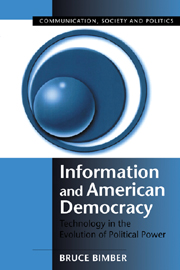Book contents
- Frontmatter
- Contents
- List of Figures and Tables
- Acknowledgments
- 1 Information and Political Change
- 2 Information Revolutions in American Political Development
- 3 The Fourth Information Revolution and Postbureaucratic Pluralism
- 4 Political Organizations in the Fourth Information Revolution
- 5 Political Individuals in the Fourth Information Revolution
- 6 Information, Equality, and Integration in the Public Sphere
- Select Bibliography
- Index
5 - Political Individuals in the Fourth Information Revolution
Published online by Cambridge University Press: 19 December 2009
- Frontmatter
- Contents
- List of Figures and Tables
- Acknowledgments
- 1 Information and Political Change
- 2 Information Revolutions in American Political Development
- 3 The Fourth Information Revolution and Postbureaucratic Pluralism
- 4 Political Organizations in the Fourth Information Revolution
- 5 Political Individuals in the Fourth Information Revolution
- 6 Information, Equality, and Integration in the Public Sphere
- Select Bibliography
- Index
Summary
THE INFORMED CITIZEN?
The value of an informed citizenry is a well-established tenet of American popular culture. At the core of good citizenship, so the belief goes, is the reasoned consideration of political information by citizens with an interest in civic affairs. To be informed is to fulfill part of one's civic duty, not only because information is a gateway into political engagement, but because being informed is itself virtuous. In short, the informed citizen is the responsible citizen, and the responsible citizen an informed one.
The story of information revolutions up through the rise of contemporary information technology raises an interesting question about this ideal of informed citizenship. If the evolution of media and the changing characteristics of information across time lead to changes in the nature of political intermediaries, what about levels of citizen engagement? Is the rise of information abundance and new postbureaucratic structures for collective action in the contemporary period linked to broader engagement in politics? Some of the case studies of the last chapter may seem to imply that the answer is yes. The Million Mom March, the Know Your Customer protest, and the new “lite-green” environmental affiliates might suggest that altered organizational structures are broadening participation in politics. As the nature of membership and the boundaries of organizations are altered, it may be that larger numbers of citizens are being drawn into politics – unless organizational changes simply mean new patterns of alliance and engagement by the same body of citizens engaged in politics in the past.
- Type
- Chapter
- Information
- Information and American DemocracyTechnology in the Evolution of Political Power, pp. 197 - 228Publisher: Cambridge University PressPrint publication year: 2003



